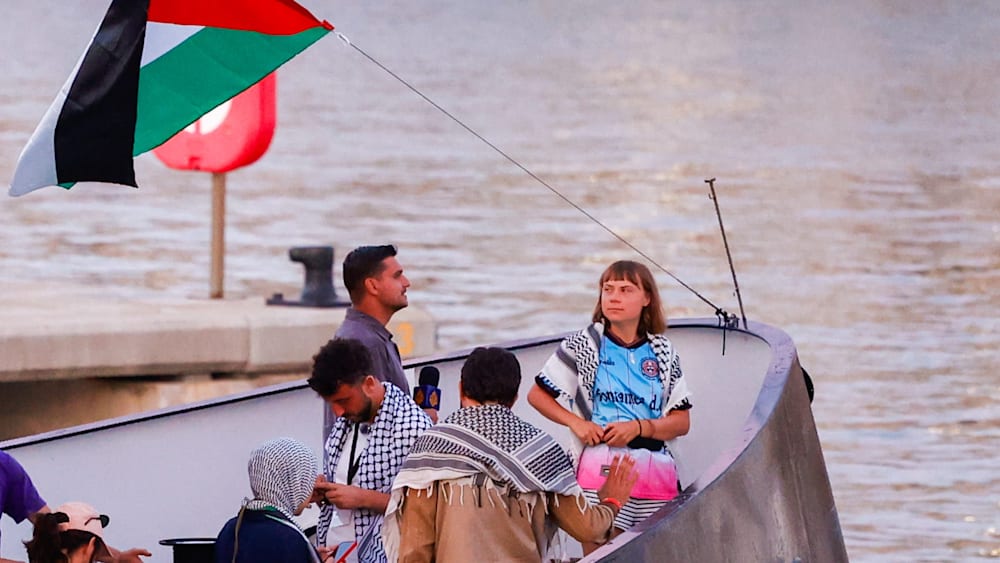The humanitarian crisis in Gaza has drawn worldwide attention, with activists, aid groups, and governments debating how to provide urgent relief to the besieged population. Recently, an aid flotilla carrying supplies and led in part by climate activist Greta Thunberg captured international headlines. The mission aimed to break through blockades and deliver desperately needed humanitarian aid to civilians in Gaza. However, severe weather conditions in the Mediterranean forced the flotilla to abandon its course and turn back before reaching its destination.
- The Humanitarian Crisis in Gaza
- Greta Thunberg’s Involvement
- The Journey and the Setback
- Symbolism of Turning Back
- International Reaction
- The Historical Context of Gaza Aid Flotillas
- Challenges of Delivering Aid by Sea
- Expert Perspectives
- Future Possibilities for Aid Missions
- FAQs
- Why did the aid flotilla with Greta Thunberg turn back from Gaza?
- What kind of aid was the flotilla carrying?
- How is Greta Thunberg connected to the Gaza flotilla?
- Has this kind of mission been attempted before?
- What happens next for Gaza aid efforts?
- Conclusion
The development sparked both disappointment and renewed global debate. Many supporters praised the courage of the activists and highlighted the symbolism of Greta Thunberg’s involvement, while critics questioned the feasibility and risks of such missions. The event also raised larger questions about the humanitarian situation in Gaza, international responses, and the intersection of climate activism with political and human rights movements.
This article explores the story in depth, examining what happened, why it matters, and what it reveals about the complex geopolitical and humanitarian challenges surrounding Gaza today.
The Humanitarian Crisis in Gaza
To understand the importance of the flotilla, it is essential to grasp the scale of the humanitarian crisis in Gaza. The enclave, home to over 2.3 million people, has been under blockade for years, creating a fragile humanitarian situation. Reports from international organizations, including the United Nations, describe dire shortages of food, medicine, clean water, and electricity. According to UNICEF, nearly half of Gaza’s population are children, many of whom suffer from malnutrition and trauma caused by repeated cycles of conflict.
The blockade has made it extraordinarily difficult for humanitarian aid to enter Gaza consistently. While some aid does pass through official channels, critics argue that bureaucratic hurdles, political tensions, and security restrictions prevent the free flow of urgently needed supplies. This has given rise to grassroots and activist-driven initiatives, such as aid flotillas, which attempt to bring relief directly by sea.
Greta Thunberg’s Involvement
Greta Thunberg is best known as a global climate activist who galvanized millions of young people through her “Fridays for Future” movement. Her decision to join and support an aid flotilla to Gaza reflects her broader approach to activism, where climate justice is tied closely to social and humanitarian justice.
For Thunberg, the plight of civilians in Gaza aligns with her message about global responsibility and interconnected struggles. She has repeatedly emphasized that climate justice cannot be separated from issues of human rights, inequality, and political oppression. Her participation brought unprecedented visibility to the flotilla, ensuring that global media outlets and millions of supporters followed the journey closely.
Observers noted that Thunberg’s presence also made the mission highly symbolic. It was not just about delivering food or medical supplies; it was about raising awareness and pressuring governments to act. In many ways, the flotilla became a floating protest, highlighting both humanitarian urgency and international inaction.
The Journey and the Setback
The flotilla, consisting of several vessels carrying aid and international activists, set sail with determination. According to organizers, the cargo included essential medical supplies, food, and water purification equipment—items desperately needed in Gaza. The voyage was carefully planned to avoid confrontations, as previous flotilla missions in the region have faced interception and even violent clashes.
However, nature proved to be the ultimate barrier. Severe weather in the Mediterranean, including high waves, strong winds, and dangerous currents, made navigation increasingly risky. Maritime safety experts accompanying the flotilla warned that continuing could put both the crew and the cargo at serious risk.
After tense deliberations, the organizers made the difficult decision to turn back. Greta Thunberg, addressing supporters, expressed deep disappointment but emphasized that safety had to come first. She reiterated that the mission’s message remained unchanged: the people of Gaza need immediate help, and the world cannot look away.
Symbolism of Turning Back
While some might view the flotilla’s return as a failure, many activists argued the opposite. They contended that the attempt itself was powerful enough to draw global attention to the issue. The fact that Greta Thunberg and other activists risked such a dangerous voyage underscored the urgency of Gaza’s humanitarian crisis.
Symbolically, the journey highlighted the many barriers—natural, political, and logistical—that prevent aid from reaching those who need it most. The storm that forced the flotilla to turn back became a metaphor for the broader challenges faced by humanitarian efforts in conflict zones.
Moreover, the international media coverage ensured that even though the supplies did not reach Gaza, the mission sparked new discussions about how aid can and should be delivered.
International Reaction
The global response to the flotilla’s setback was swift. Human rights organizations expressed solidarity with the activists, praising their courage and calling on governments to do more. Amnesty International and Human Rights Watch reiterated that humanitarian aid should never be obstructed, regardless of political conflicts.
Political reactions were mixed. Some governments emphasized that while humanitarian aid is necessary, missions like the flotilla complicate security arrangements in the region. Others quietly acknowledged that such actions highlight failures of the international system to protect civilians in Gaza.
On social media, the event trended worldwide. Hashtags combining Greta Thunberg’s name with Gaza aid circulated widely, drawing attention from both her climate activist base and human rights advocates. For many young activists, the flotilla reinforced the idea that their generation’s struggles—whether climate, justice, or human rights—are interconnected.
The Historical Context of Gaza Aid Flotillas
The recent mission is part of a broader history of flotilla efforts to deliver aid to Gaza. Perhaps the most famous was the 2010 Freedom Flotilla, which ended in tragedy when Israeli forces intercepted the ships, leading to deaths and international outrage. Since then, various smaller initiatives have attempted to repeat the effort, with varying degrees of success.
Each of these missions has served as both a humanitarian attempt and a political statement. By challenging the blockade directly, flotillas draw global attention and force conversations that otherwise might remain confined to diplomatic circles. Greta Thunberg’s involvement in the latest effort continues this legacy, while also bridging climate activism with humanitarian causes.
Challenges of Delivering Aid by Sea
Delivering humanitarian aid by sea presents enormous challenges. Beyond the political and military risks of interception, there are logistical and environmental difficulties. Severe weather, as witnessed in this mission, can halt progress. Ships are also limited in how much cargo they can carry, compared to trucks or aircraft.
Experts argue that while flotillas are powerful symbols, they cannot replace structured international aid delivery systems. However, in contexts where official routes are blocked or heavily restricted, activists turn to these unconventional methods to keep the issue alive in the public eye.
Expert Perspectives
Dr. Lina al-Hassan, a Middle Eastern humanitarian policy expert, explained in an interview: “What Greta Thunberg and the flotilla have done is force the world to confront its conscience. The aid itself may not have arrived, but the mission amplifies a truth we all know—Gaza is on the edge of collapse, and the world must act.”
Meanwhile, maritime safety experts stressed that the organizers made the right decision by turning back. Captain Jonas Richter, a veteran seafarer, noted: “No aid mission is worth the loss of lives at sea. Severe weather in the Mediterranean can overwhelm even experienced crews. The decision to return was responsible and should not overshadow the courage of the mission.”
Future Possibilities for Aid Missions
The failed voyage raises questions about what comes next. Organizers have vowed to regroup and attempt new methods of delivering aid. Some activists suggest planning a larger, better-equipped flotilla once conditions improve. Others call for more pressure on governments and international institutions to facilitate secure humanitarian corridors.
Greta Thunberg herself has hinted that she will continue supporting such initiatives, emphasizing that turning back does not mean giving up. Her message was clear: the world’s attention must not waver just because one attempt faced setbacks.
FAQs
Why did the aid flotilla with Greta Thunberg turn back from Gaza?
The flotilla turned back due to severe weather conditions in the Mediterranean, which made it unsafe for the vessels and crew to continue the journey. Safety concerns outweighed the risks of proceeding, leading organizers to make the difficult decision to return.
What kind of aid was the flotilla carrying?
Organizers reported that the ships carried essential humanitarian supplies, including medical equipment, food, and water purification systems—items urgently needed by civilians in Gaza.
How is Greta Thunberg connected to the Gaza flotilla?
Greta Thunberg, known globally for her climate activism, joined and supported the mission as a way of linking climate justice with humanitarian and social justice issues. Her involvement brought significant global attention to the effort.
Has this kind of mission been attempted before?
Yes, aid flotillas to Gaza have been attempted multiple times in the past, most notably the 2010 Freedom Flotilla. These missions have often faced political, military, or logistical obstacles, but they continue to highlight the humanitarian crisis in Gaza.
What happens next for Gaza aid efforts?
Activists and organizers have pledged to continue their work. Some plan to attempt future flotillas, while others are pushing for international diplomatic solutions to ensure that aid reaches Gaza more consistently and safely.
Conclusion
The aid flotilla carrying Greta Thunberg may not have reached Gaza, but its impact reverberated across the globe. By turning back due to severe weather, the activists highlighted both the physical dangers of such missions and the broader symbolic obstacles standing in the way of humanitarian relief. Thunberg’s involvement underscored the growing intersection between climate justice and humanitarian struggles, reminding the world that crises are interconnected and demand urgent attention.
Far from being a failed mission, the flotilla sparked renewed debate, reignited global solidarity, and reminded millions that Gaza’s humanitarian crisis cannot be ignored. The journey may have ended prematurely, but its message sails on, demanding that governments, institutions, and citizens confront one of the world’s most pressing moral challenges.





